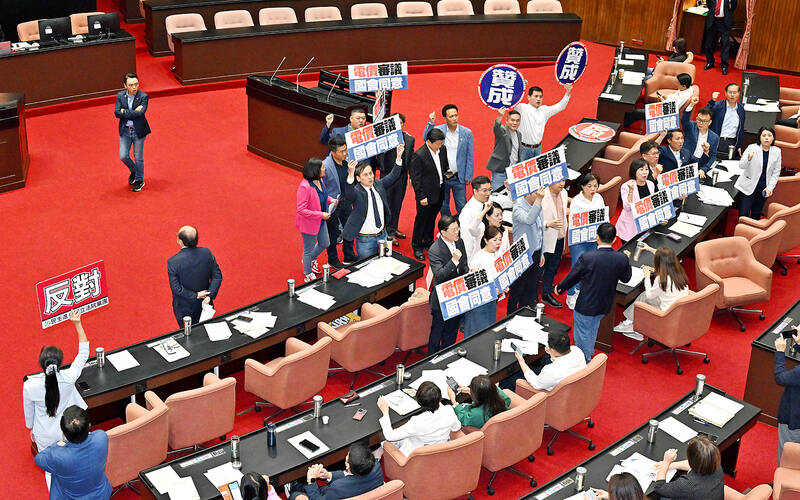The Chinese Nationalist Party (KMT) and the Taiwan People’s Party (TPP) yesterday voted against a proposed bill by Democratic Progressive Party (DPP) lawmakers that would require elected officials to seek approval before visiting China.
DPP Legislator Puma Shen’s (沈伯洋) proposed amendments to the Act Governing Relations Between the People of the Taiwan Area and the Mainland Area (臺灣地區與大陸地區人民關係條例), stipulate that contact with certain individuals in China, Hong Kong and Macau should be reported, while failure to comply would be punishable by prison sentences of up to three years, alongside a fine of NT$10 million (US$309,041).
Fifty-six voted with the TPP in opposition to the bill and 49 for, sending the proposal back to the Procedural Committee.

Photo: Tien Yu-hua, Taipei Times
Shen said that he had expected this from the KMT, but had not anticipated the TPP aiding the KMT.
The TPP was not just the KMT’s lackey, but was also helping the Chinese Communist Party prevent the DPP from closing loopholes which would help safeguard national security, DPP Legislator Hung Sun-han (洪申翰) said.
TPP Legislator Chen Gau-tzu (陳昭姿) said that the proposed amendments were rough around the edges and she was solidly against double standards.
Chen, who is known for her pro-Taiwanese independence stance, said she had once been a DPP supporter, but the party has demonstrated that it was prone to forgetting promises.
Chen asked whether DPP members were all on board with the proposed amendment, citing visits to China by Minister of Economic Affairs Wang Mei-hua (王美花) and Presidential Office Secretary-General Lin Chia-lung (林佳龍) when they were head of the Taiwan Intellectual Property Office and Taichung mayor respectively, as well as Vice Premier Cheng Wen-tsan’s (鄭文燦) visit to Macau.
In other developments, opposition lawmakers yesterday used their majority in the legislature to send a proposed amendment giving lawmakers the final say in electricity prices directly to a second reading. It passed with a 58-51 vote.
The proposed revision to Article 49 of the Electricity Act (電業法) requires electricity rate changes by the Ministry of Economic Affairs’ power price review committee to be submitted to the Legislature for approval, or it cannot be implemented.
Legislation must pass three readings to become law. In the first reading, the titles of proposed bills are read out loud and then referred to the appropriate committees for review before being sent to a second reading. If a motion is seconded by at least 20 lawmakers and passes a vote, it could be sent straight through to the second reading without being referred to a committee for examination.
The amendment came after the government on Tuesday said that the electricity rate hike for last month would not be changed, despite a resolution passed by lawmakers to freeze the policy.
The opposition yesterday also sent a proposed amendment to the Securities and Exchange Act (證券交易法), which said that listed companies must share their surplus profits with employees in the form of additional wages, directly to a second reading.

Several Chinese Nationalist Party (KMT) officials including Chairman Eric Chu (朱立倫) are to be summoned for questioning and then transferred to prosecutors for holding an illegal assembly in Taipei last night, the Taipei Police said today. Chu and two others hosted an illegal assembly and are to be requested to explain their actions, the Taipei City Police Department's Zhongzheng (中正) First Precinct said, referring to a protest held after Huang Lu Chin-ju (黃呂錦茹), KMT Taipei's chapter director, and several other KMT staffers were questioned for alleged signature forgery in recall petitions against Democratic Progressive Party (DPP) legislators. Taipei prosecutors had filed

Taiwan would welcome the return of Honduras as a diplomatic ally if its next president decides to make such a move, Minister of Foreign Affairs Lin Chia-lung (林佳龍) said yesterday. “Of course, we would welcome Honduras if they want to restore diplomatic ties with Taiwan after their elections,” Lin said at a meeting of the legislature’s Foreign Affairs and National Defense Committee, when asked to comment on statements made by two of the three Honduran presidential candidates during the presidential campaign in the Central American country. Taiwan is paying close attention to the region as a whole in the wake of a

President William Lai (賴清德) has appointed former vice president Chen Chien-jen (陳建仁) to attend the late Pope Francis’ funeral at the Vatican City on Saturday on his behalf, the Ministry of Foreign Affairs said today. The Holy See announced Francis’ funeral would take place on Saturday at 10am in St Peter’s Square. The ministry expressed condolences over Francis’ passing and said that Chen would represent Taiwan at the funeral and offer condolences in person. Taiwan and the Vatican have a long-standing and close diplomatic relationship, the ministry said. Both sides agreed to have Chen represent Taiwan at the funeral, given his Catholic identity and

NEW WORLD: Taiwan is pursuing innovative approaches to international relations through economics, trade and values-based diplomacy, the foreign minister said Taiwan would implement a “three-chain strategy” that promotes democratic values in response to US tariffs, Minister of Foreign Affairs Lin Chia-lung (林佳龍) said. Taiwan would aim to create a “global democratic value chain,” seek to capitalize on its position within the first island chain and promote a “non-red supply chain,” Lin was quoted as saying in the ministry’s written report to the Legislative Yuan submitted ahead of the legislature’s Foreign Affairs and National Defense Committee meeting slated for today. The Ministry would also uphold a spirit of mutual beneficial collaboration, maintaining close communication and consultations with Washington to show that Taiwan-US cooperation